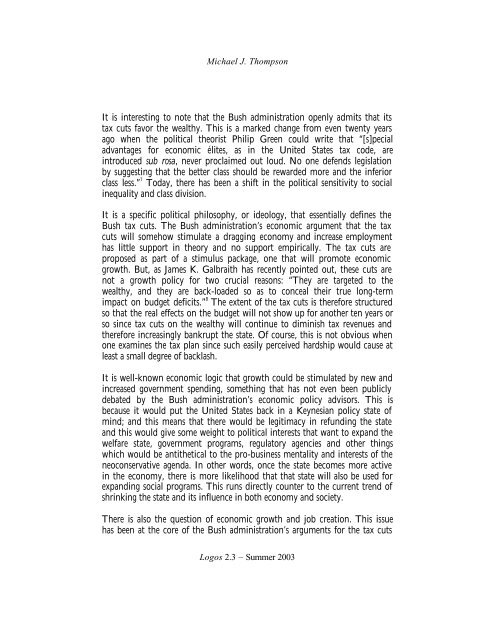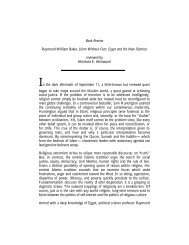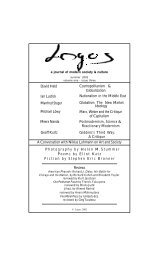Michael J. Thompson Stephen Eric Bronner Wadood Hamad - Logos
Michael J. Thompson Stephen Eric Bronner Wadood Hamad - Logos
Michael J. Thompson Stephen Eric Bronner Wadood Hamad - Logos
Create successful ePaper yourself
Turn your PDF publications into a flip-book with our unique Google optimized e-Paper software.
<strong>Michael</strong> J. <strong>Thompson</strong><br />
It is interesting to note that the Bush administration openly admits that its<br />
tax cuts favor the wealthy. This is a marked change from even twenty years<br />
ago when the political theorist Philip Green could write that “[s]pecial<br />
advantages for economic élites, as in the United States tax code, are<br />
introduced sub rosa, never proclaimed out loud. No one defends legislation<br />
by suggesting that the better class should be rewarded more and the inferior<br />
class less.” 7 Today, there has been a shift in the political sensitivity to social<br />
inequality and class division.<br />
It is a specific political philosophy, or ideology, that essentially defines the<br />
Bush tax cuts. The Bush administration’s economic argument that the tax<br />
cuts will somehow stimulate a dragging economy and increase employment<br />
has little support in theory and no support empirically. The tax cuts are<br />
proposed as part of a stimulus package, one that will promote economic<br />
growth. But, as James K. Galbraith has recently pointed out, these cuts are<br />
not a growth policy for two crucial reasons: “They are targeted to the<br />
wealthy, and they are back-loaded so as to conceal their true long-term<br />
impact on budget deficits.” 8 The extent of the tax cuts is therefore structured<br />
so that the real effects on the budget will not show up for another ten years or<br />
so since tax cuts on the wealthy will continue to diminish tax revenues and<br />
therefore increasingly bankrupt the state. Of course, this is not obvious when<br />
one examines the tax plan since such easily perceived hardship would cause at<br />
least a small degree of backlash.<br />
It is well-known economic logic that growth could be stimulated by new and<br />
increased government spending, something that has not even been publicly<br />
debated by the Bush administration’s economic policy advisors. This is<br />
because it would put the United States back in a Keynesian policy state of<br />
mind; and this means that there would be legitimacy in refunding the state<br />
and this would give some weight to political interests that want to expand the<br />
welfare state, government programs, regulatory agencies and other things<br />
which would be antithetical to the pro-business mentality and interests of the<br />
neoconservative agenda. In other words, once the state becomes more active<br />
in the economy, there is more likelihood that that state will also be used for<br />
expanding social programs. This runs directly counter to the current trend of<br />
shrinking the state and its influence in both economy and society.<br />
There is also the question of economic growth and job creation. This issue<br />
has been at the core of the Bush administration’s arguments for the tax cuts<br />
<strong>Logos</strong> 2.3 – Summer 2003




